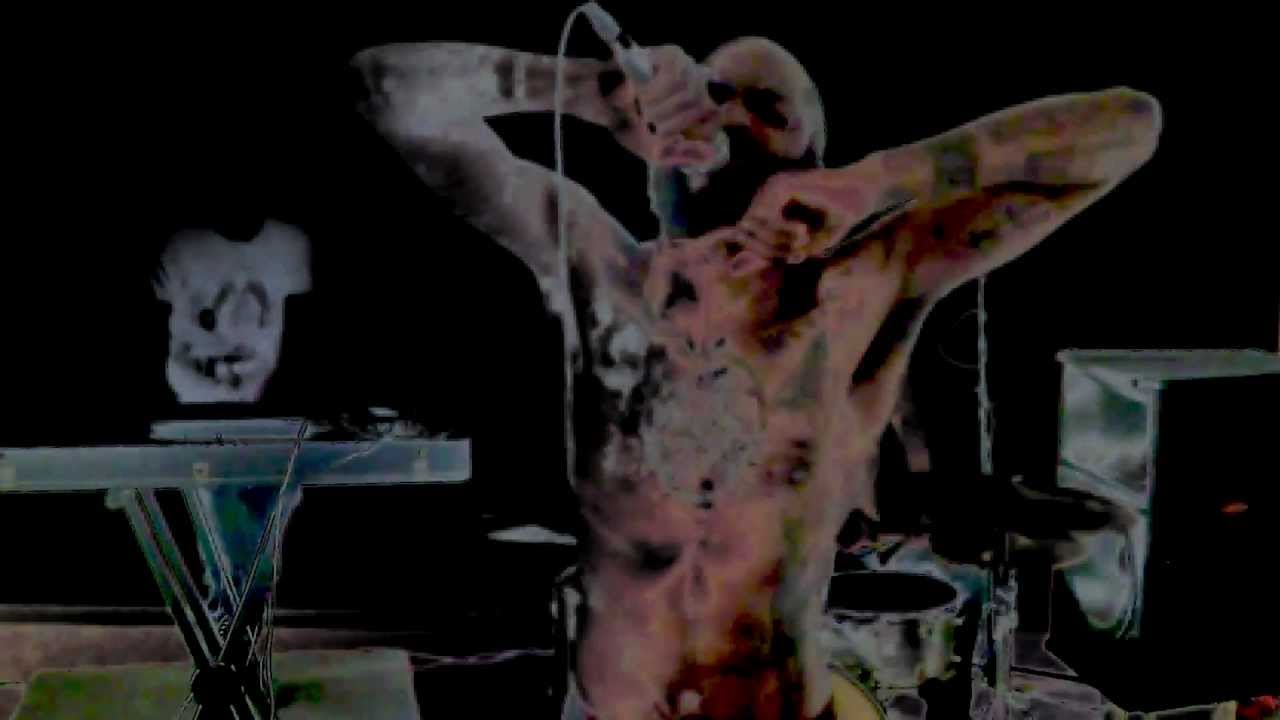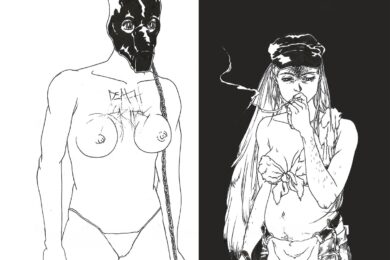So, you remember Ex-Military‘s curtain-raiser, ‘Beware’?
It began with a sampled Charles Manson – the sinuous vessel that would deliver pop culture’s first true embodiment of the apocalypse. Wired and seething, Manson twitched with paranoid indignation, the violence in his tone threatening something terrible, something demonic and total. At the peak of his embittered invective, his rage is finally consummated, with an orgasmic release of Mariachi doom, ritualistic chants and towering curtains of bass. And there, in a noose overhead, hung a warlock of iron and sin, who like Manson was the Ubermensch: the super man who hated God, killed God, became God. “I am the law-maker” pronounced Mansun. “I am the beast I worship” sayeth MC Ride. Meh, same difference.
It was the stuff of dire portent: the upside-down Sermon on the Mount. The writing was on the wall, spelt backwards, in black blood – Beware… A storm is coming.
The Money Store is what Satan did next. By this point the journey is over, no introductions needed. Hell is now. Make yourself comfortable, you have all the time in the underworld.
‘Get Got’
A less auspicious opening than ‘Beware’, a sinisterly subdued Ride reclines in the corner of the mix, babbling yellow-smoke through a wired jaw and proffering sick suggestions over a flailing Eastern-tinged loop.
‘The Fever (Aye Aye)’
Death Grips, yes, but certainly not as we know them. An alleviated creation next to the pressurised gruel that follows; despite the portentous intro, Zach Hill’s frenzied drums and a taut Ride on high alert, it’s a lysergic synth loop that defines ‘The Fever’, imposing a (nearly) relaxed gait and an air of strung-out decadence. With the loop framed against a sci-fi-industrial backdrop, the end product plays like G-funk in the aftermath zone.
If the rest of The Money Store plays out under an inky night-sky, ‘The Fever’ is its final dusk; petroleum pink skies framing the soldiers on a hard-earned bit of home leave. Or ‘a stay of execution’, as Ride insists, the big killjoy.
‘Lost Boys’
Drooling itself through the lattice of a slow-surging beat, a didgeridoo-like burden makes doppler mincemeat of your inner-ear balance, until, cutting through the sibilant Srrrssssh of military-radio interference, a deadened hoochie-girl broadcasts to the air waves, giving a big shout-out to the titular forsaken. The power cuts out and Ride spews forth the album’s most quotable line: “It’s such a LONG… WAY… DOWN!” His voice ricochets into the darkness… dropping to the lower levels of the mix – all the way down to DOWN THERE, with the lost boys: the children of the damned, the avenging incubus of Sacramento’s inescapable projects. The atmosphere is electro-magnetic, the beat enslaving, the anti-establishment vitriol heady. This is The Money Store at its most oppressed.
‘Black Jack’
The sensory overload on the floor of Hell’s casino, ‘Black Jack’s bombarding production – unbalancing and overwhelming with many events occurring at once – mimics some sparking doomsday one armed bandit, some Tarot slot machine for those fun (end) times ahead. Because the kicker is, however many times you pull the lever the outcome is ALWAYS triple-Pale Rider. If horror-rap dealt with the ever present threat of gang murder, death is a foregone conclusion here. Treated and diced, Ride glitches as the slotter’s wheels turn, but “no need to count the deck out, it’s all black”… death is an inevitably: Black Jack, every time. The dice are loaded in inner city California.
Bookended with heartbeat-echoing drum, ‘Black Jack’ is powered by a machinelike bass drone, far-off nuclear klaxons and Ouija reverse-vocals. It’s unique hip hop. In fact, both technically futuristic and as hopeless as the blackest metal, it’s unique in music generally: a meeting of the occult and tech-noir futurism, in a impressionistic portrayal of a life in chains in underclass America. The science-obsessed Death Grips are always mindful of the very first rule of Afro-futurist sci-fi: that the apocalypse the white sci-fi writers likes to dream of, has already happened, in the black American experience.
‘Hustle Bones’
With its girly micro-sample spinning rapidly over monster bass charges, ‘Hustle Bones’ packs a Brit post-rave aftertaste, for all intents and purposes recalling the lumbering ballast of rockist dubstep. The Money Store‘s most turgid cut, nonetheless it’s infinitely more exotic, hard-hitting and generally badass than its closest counterpart in the mainstream – the shrill, bass-light neo-crunk practiced by the trap-rap set.
‘I’ve Seen Footage’
Although uncharacteristically knockabout, nevertheless Death Grips’ take on booty-bass is as much an exercise in dark subversion as it is a straight-up tribute to rap’s most sexually deviant sub-genre; harbouring a vein of satirical comedy as black as Nick Cave’s left lung.
Returning to their favoured theme of infection-by-technology, a Videodrome-esque tale of techno-voyeurism charts an impish Ride as he watches aghast, and perhaps aroused, a grainy VHS from the outer limits of human degradation, containing God-know-what atrocities visited on frail flesh and tender souls. As if fascinated by his own depravity, over the sound of a descending, off-colour guitar, Ride marvels: “I’ve seen some crazy shit”. And you really believe him. Then, as if to literalize the dehumanizing toll the technology has exacted, Ride’s vocals are computerized into abstraction. The transformation is complete. Like 2-Live Crew meets Tetsuo: Body Hammer, funky isn’t the word – this is nasty. Booty-bass never sounded so offensive, and that’s exactly the point.
‘Double Helix’
‘Double Helix’ procrastinates in surrealistically incongruous samples – snippets of tranquillity and tentative ebullience that lend false hope of salvation – but it’s only delaying the inevitable. Because it isn’t long before we’re back on the river, carried inexorably forward by humming toms, snare loops and the haunting inevitability of a tolling bell, to meet the maker. “Do you really wanna know…t’Devil?” asks Ride. Not right now, chief, definitely not right now. Relatively sparse and content just to fester in cavernous space and implied violence, ‘Double Helix’ is the closest thing to The Money Store‘s ‘Guillotine’. After which, the album moves in only one direction and fast – straight down.
‘System Blower’
Not so much systems, as minds. An obnoxious fuck of a thing, ‘System Blower’ is custom-designed for schooling the doughy masses in the everyday life of an urban monster, with matters rendered all the more taunting by a measure of sheer vainglorious verve; instances of vamping terror like the blinding flashes of glamourously horrified screams – the sound a grenade makes at a debutante’s ball – which freeze-frame Ride in all his diabolic glory. Then comes the clincher – the full weight of an insistent, unstoppable bass-beat, keeping the cauldron boiling until a metallic wobble-bass arrives to push the aggression levels right off the scale.
Punk by any other name, presumably this is how the trio respond to what they refer to as the state’s ‘weaponry of fear’. Fight fire with fire, ‘System Blower’ suggests, blow some anthrax off your palms. That they do.
‘The Cage’
If the party is in full swing on ‘The Cage’, its not a party you’d attend without an intimidating stock of hunting knives and a cyanide chaser. Vintage Death Grips, the track undermines its own heaving block party with a motorcade of apocalyptic paraphernalia – sour, falling bass-smears that strike fear into your brimming heart, while in the background MC Ride plans mass murder with some very big guns. If there’s no tomorrow, what else can you do but dance?
‘Punk Weight’
Rounding off a three-track run of macabre club-bangers, from an inauspicious intro of arabic pop explodes ‘Punk Weight’, which with its depth-charge toms and heavy stride is nothing if not true to it’s titular word. Punctuated by frequent and fabulous blasts of opulent synths, like ‘System Blower’ it resonates with a twisted kind of vanity. Because, if the Californians are going put a bomb under mainstream rap, they’ll be damned if they don’t look good while setting the charges.
‘Fuck That’
From Ride’s telegraphic phonetics, two things can be gleaned. Just about that is, seeing that at every juncture of The Money Store, the rapper’s vocals are distorted almost beyond legibility. Firstly, he considers ‘Fuck That’ to be “Black mass murder-rap". There you go – from the horse’s mouth. Secondly, apparently it’s tough being a harbinger of doom comprised mainly of distilled evil. Hell, sometimes it’s tough to even look in the mirror. Evidently self-loathing is as essential a component to the DG sound as an unlimited resource of barbaric fury. We said it all along.
A relatively mediocre track, what begins as a driving voodoo groove quickly descends into unsure drum programming, entangled arrangements and ultimately, a perfunctory, disorderly grind through 4th world weirdness. It’s only here that you really feel the absence of the guitar samples that provided the foundation for much of Ex-Military.
‘Bitch Please’
Merging the generator-like hum of a throbbing bassine with cracking hand-clap drums, the half-step swagger underfoot here provides the perfect setting for Ride’s cyperpunk rant, which churns through themes of network terrorism and self-digitalisation. "I am the darkness creeping through your system" – warns the MC, descending sine-waves percolating through your mind’s choking hard drive. Add in the oriental synths and you’ve got the makings of some Ridley Scott techno-thriller about Japanese corporate imperialism.
‘Hacker’
Death Grips do disco like they do homicidal hip hop, with an even balance between mania and menace. Not to mention a firm commitment to make your complete annihilation as outright fun as possible. Without a doubt the best track here, ‘Hacker’ lifts the entire album out of its self-made nightmare, the chrome-plated pomp serving as a dynamite foil to paranoiac sci-fi. A stupendous closing gambit.
The Money Store Is released on April 23rd. Death Grips play the Quietus Village Mentality Stage at Field Day on June 2nd 2012





